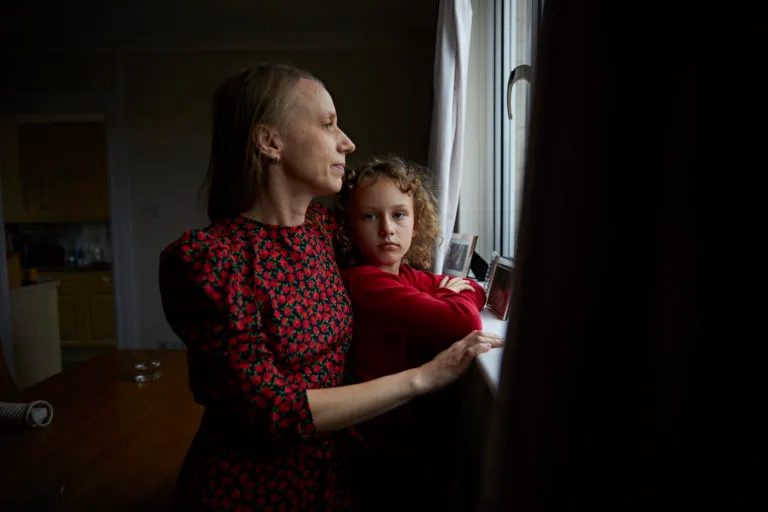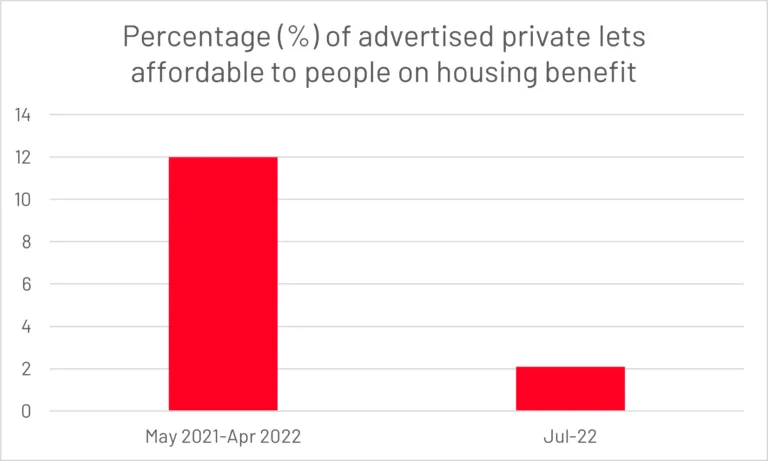Shocking new statistics show affordable private rents are vanishing
Published: by Charlie Berry

Growth has been the buzzword this week. But unless the government takes urgent action to unfreeze failing housing benefit, we’re likely to see a huge growth in homelessness over the coming months.
New research (published today) reveals the acute shortage of rentals available to the third of private renters now claiming housing benefit. Just one in 50 privately rented homes advertised in July were affordable for renters claiming housing benefit. That’s the shocking finding of new research from the Bureau of Investigative Journalism supported by Shelter which features in a Channel 4 Dispatches programme this evening (Friday 7 October).
Housing benefit has been frozen at the same level since March 2020 – while rents have shot up by over 5% in England, and in some areas by more than 8%. But evidence shows that when you just look at newly advertised properties, the increases have been much bigger.
Rising homelessness
The amount people who can claim in housing benefit is set by Local Housing Allowance (LHA), which is supposed to reflect the cost of the cheapest 30% of homes in a local area. But the freeze means that LHA has slipped far behind the real cost of renting, both of those already in tenancies who are seeing big increases in the amount they have to pay and for those searching for new homes.
The risk is that this causes more and more households to become homeless, because advertised rents are the market prices which people have to contend with when they lose their home and need a new place to live. It comes on top of news reports of stiff competition in the private rental market, including bidding wars, and longstanding discrimination against low income renters in receipt of benefits, all of which mean millions of households are locked out of private lets and facing homelessness.
Collapse in affordable homes
To find out just how challenging the rental market now is for those who rely on LHA, the Bureau of Investigative Journalism analysed two-bedroom private lets advertised on Rightmove across Britain in July 2022. Two-bed homes are the most common size rented by those who get LHA through Universal Credit. Their findings were shocking:
- just one in 50 (2.1%) of homes advertised in England were affordable within LHA rates
- in 18 areas there was not a single affordable property advertised in the month – most of these places were towns or rural areas like Swindon, Ipswich, East Sussex and South Devon
- in Bristol just one affordable property was advertised in the month – and it was let and removed from the market within a week
What’s worse, affordable private rents seem to be disappearing at an alarming rate. Comparison to similar research by Crisis over 2021 and early 2022 indicates the number of homes affordable within LHA rates has collapsed – from one in 8 to just one in 50 – over the space of a few months.

Source for data from May 2021-April 2022: Crisis and Zoopla, Falling short: Housing benefit and the rising cost of renting in England. Source for data from July 2022: Bureau of Investigative Journalism, Lack of affordable lets leaves families with little left to live on.
Struggling low-income households
For people on low incomes who lose their homes right now, it is clear that the situation is dire and they are at serious risk of becoming homeless because the market is unaffordable to them. People like Rachel*, whose story we included in our Cover the Cost report published last month. Rachel lives with her three children in Shropshire and is a full-time carer for her middle daughter who has disabilities following a childhood stroke. When her landlord decided in March 2022 to sell the home she has lived in for eight years, Rachel found it impossible to find a new affordable home that was suitable for her family, and had to approach the homelessness team at her local council for help.
The simple fact is that if housing benefit is not adequate to allow people to find and afford new privately rented homes, more and more families like Rachel’s will be pushed into homelessness. Without adequate housing benefit and with a severe shortage of social housing, councils will be able to do little more and place increasing numbers into unstable and often low-quality temporary accommodation. Shockingly, almost 120,000 homeless children are already living in temporary accommodation. The Dispatches programme shows the severe impact on the health, wellbeing and finances of the families forced to live in these circumstances.
Stop homelessness now
The government urgently needs to step up to prevent homelessness in this crisis. You can join us in the fight for home by emailing your MP, asking them to tell the new secretaries of state for housing and welfare that they must stop homelessness now by making housing benefit adequate.
Dispatches: Britain’s Evicted Kids will be broadcast on Channel 4 at 7:30pm this evening (Friday 7 October).